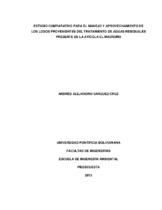Estudio comparativo para el manejo y aprovechamiento de los lodos provenientes del tratamiento de aguas residuales presentes en la Avícola el Madroño
Fecha
2013Director/Asesor
Kopytko, María Irena
Tipo de contenido
Trabajo de grado
Citación
Metadatos
Mostrar el registro completo del ítemDocumentos PDF
Resumen
El proyecto de estudio comparativo para el manejo y aprovechamiento de los lodos provenientes del tratamiento de aguas residuales presente en la Avícola El Madroño, busca establecer alternativas para dar un manejo adecuado a los lodos residuales generados en la planta de tratamiento de aguas residuales, logrando de esta forma mitigar el impacto ambiental negativo que estos ocasionan al área donde son dispuestos, al ambiente y a la población de la zona aledaña a la empresa. En primera instancia se realizó un estudio en laboratorio de los lodos residuales, con el fin de conocer sus características y su calidad para poder ser aprovechados. Posteriormente se establecieron los métodos de compostaje y lombricultura como alternativas para el tratamiento y manejo de los lodos y se realizó el montaje de estos procesos a lo largo de 3 meses. A continuación se analizaron en un laboratorio los abonos resultantes de estos 2 ensayos y se compararon con los parámetros establecidos por el Instituto Colombiano Agrario, para su posible comercialización como fertilizantes o remediadores de suelos, dando como mejor abono el resultante del método de compostaje. Como última fase se llevó a cabo un análisis de relación Beneficio/Costo (B/C) que dio como resultado que el método de compostaje daba económicamente viable a los 3 meses. Finalmente el proyecto arrojó resultados positivos en cuanto a que el proceso de compostaje surge como la alternativa más adecuada para el tratamiento de estos lodos, ya que es un proceso que presenta rápidos resultados y que además no requiere de una disponibilidad total de tiempo, aspecto que beneficiaría enormemente a la empresa, ya que la generación de lodos residuales en esta es muy alta y se hace necesaria la implementación de un manejo rápido y efectivo de los lodos. The comparative study project for the handling and availment of the sludge coming from wastewater treatment present at the poultry "El Madrono", seeks to establish alternatives to give adequate management to residual sludge generated at the wastewater treatment plant, thereby achieving mitigating the negative environmental impact that these cause to the area where they are disposed, to the environment and to the population of the area surrounding the company. At first instance, a study in laboratory of the residual sludge was conducted for the purpose of knowing its features and quality in order to be availed. Afterwards, the composting and vermiculture methods were established as alternatives for the treatment and handling of the biosolids, and the assembly of these processes was performed over a period of three months. Subsequently, the resulting composts from these two tests were analyzed and compared with the parameters established by the Colombian Agrarian Institute, for their possible commercialization as fertilizers or soil remediators, giving the best compost the resulting from the composting method. As the final phase, a cost/benefit relation was carried out which resulted in composting method being economically feasible at 3 months. Finally, the Project yielded positive results in that the composting process emerges as the most suitable alternative for the treatment of biosolids, since it's a process that provides quick results and doesn't require a total availability of time, something that would greatly benefit the company since its residual sludge generation is very high and it becomes necessary to implement a fast and effective handling of the sludge.
Palabra/s clave
Empresas - Avícola Mandrañon
Lombricultura
Aguas residuales
Compost
Abonos
Fertilizantes
Colecciones
- Trabajos de grado [6698]
El ítem tiene asociados los siguientes ficheros de licencia:


